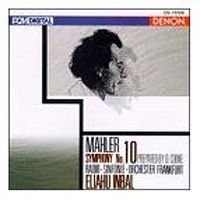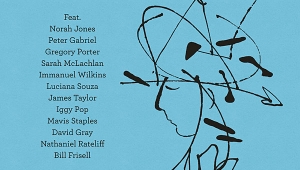| Columns Retired Columns & Blogs |
Recording of August 1993: Mahler: Symphony 10
MAHLER: Symphony 10 First Performing Version by Deryck Cooke
Eliahu Inbal, Frankfurt RSO
Denon CO-75129 (CD only). Yoshiharu Kawaguchi, Richard Hauck, prods.; Detlev Kittler, eng. DDD. TT: 70:59
Eliahu Inbal, Frankfurt RSO
Denon CO-75129 (CD only). Yoshiharu Kawaguchi, Richard Hauck, prods.; Detlev Kittler, eng. DDD. TT: 70:59
The closing Adagio of Gustav Mahler's Ninth Symphony, with all its apparent acceptance of and glowing resignation to death, would seem to write such a perfect Fin to the composer's musical and physical lives that many conductors have been loath to even peer into the magpie's nest of the uncompleted Tenth.
 I've found this outlook so seductive over the years that I've indulged in what I now see as the convenient irresponsibility of considering Symphony 10 not much more than a rehash of musical breakthroughs that Mahler had made more convincingly years before. The Tenth seemed to me a work that Mahler did not actually need to finish, one that he could afford to leave incomplete at his death.
I've found this outlook so seductive over the years that I've indulged in what I now see as the convenient irresponsibility of considering Symphony 10 not much more than a rehash of musical breakthroughs that Mahler had made more convincingly years before. The Tenth seemed to me a work that Mahler did not actually need to finish, one that he could afford to leave incomplete at his death.
But with the recordings of Kurt Sanderling and now, most emphatically, Eliahu Inbal, 10 at last sounds to me like a work that, had Mahler lived another two or three years, would have likely proven a bridge between the fatalistic, death-drenched Das Lied von der Erde and Symphony 9, and what might have constituted Symphonies 11 and even 12. At least one of the latter mythical works might have been the Mahler masterpiece that 10, even in its incomplete state, clearly is not. (After that, of course, World War I would have changed everything.)
Still, only minimal apology need be made for 10, whether in the through-composed if half-orchestrated state in which Mahler left it at his death, or in any of the remarkably responsible "performing versions" the polishing of which occupied much of the last 16 years of Deryck Cooke's life. As Cooke was always at pains to point out, 90% of Symphony 10 is pure, unadulterated Mahler. And, to answer my own caveat of yesteryear, it's clear that Mahler completed more than enough of his final work for us to know almost exactly what he was trying to say.
All that said, Eliahu Inbal has turned in a performance of Cooke's First Performing Version (previously recorded only by brave but hapless Eugene Ormandy, clearly out of his depth in his profoundly superficial and out-of-print 1965 Columbia recording) that seemingly does the impossible in providing whatever had been missing in the work of Mahler and Cooke, and the recordings of almost all other conductors, without in any way making the work any less Mahler's. The result is a recording that sounds more like Mahler than any other.
A caution, though: It sounds more like Inbal's Mahler. As I made more than clear in my reviews of his comprehensive Mahler cycle in Vol.10 Nos.7-9 and Vol.11 Nos.1 & 3, I do love Inbal's way with a Mahler score. Other conductors may be more passionate, more powerful, even more profound, but Inbal is unique in his ability to invariably bring to these unwieldy, often weedy, awkward, and top-heavy works a grace, a balletic lightness without loss of substance or integrity, a dancing sense of almost Mozartian swing that is absolutely confident in what it has to say and the delight it takes in saying it.
Mahler was the first composer in the Western tradition to choose to let all of his musical seams show, thereby creating a new musical language of great irony and self-consciousness, sharing with his contemporary, Charles Ives, the predilection to write music about music. But in the hands of a master musician like Inbal, those seemingly ragged seams suddenly take on all the unpredictable rightness, the burnished patina of Miles Davis's accidentally-on-purpose broken tones, or the carefully nurtured randomness of the cracks and hues of raku pottery. Suddenly, the seam or "flaw" becomes the point, the focus, something more than mere structural underpinning. In this way did Mahler, in so many other ways Wagner's careful pupil, become Wagner's opposite, as much the first post-modern as the last Romantic composer.
It would thus seem contradictory to remain true to Mahler while at the same time "hiding" his seams—especially in unfinished 10, which is virtually all seams. Inbal again does the impossible here. There is all the variety of dynamics, orchestration, and tempo that one could wish for, and in which Symphony 10's manuscript and completed scores abound. Still, never have I heard Mahler's many and complexly spliced (when spliced at all) themes dovetailed with such perfect sonic joinery. This performance is in a class by itself.
There are formidable competitors: Wyn Morris and James Levine offer expansive passion, the latter's trademark meticulousness letting us hear every note without getting in the way of the music (vide his recent Ring cycle). Simon Rattle's quintessentially Mahlerian fitfulness is both the appeal and the problem of his engagingly youthful 1980 recording, not much helped by the Bournemouth SO's gamely ragged ensemble. Riccardo Chailly's 1986 recording is overpoweringly "German" la Solti, forceful to the point of sounding forced, larger than life—Chailly seems to be trying very hard to impress.
Only in Kurt Sanderling's vital, preternaturally gutsy 1979 Ars Vivendi recording—very much in the style of Jascha Horenstein, but unfortunately out of print—does another conductor seem to refrain from forcing Mahler's hand, however respectfully; none but Inbal and Sanderling seem to trust the work itself. (All of the earlier recordings are considerably longer than Inbal's; Levine takes a full 11 minutes more.) And though I did call this "Inbal's Mahler," I hasten to qualify my qualification with the assurance that Inbal's Mahler sounds as much to me like Mahler's Mahler as does Sanderling's—but Inbal's is a Mahler recollecting his inner terrors in relative tranquility.
The opening Adagio is Inbal's second recording of the movement; he'd recorded it for his Mahler cycle six years before, in the virtually unretouched version published as Vol.IXa of Mahler's Kritische Gesamtausgabe. Though there is a mere six seconds' difference between the two performances, I much prefer the Cooke version, which, whether due to Inbal or Cooke or both, sounds a good bit meatier. Inbal has more fun with the two Scherzi than anyone has, to the point of making me laugh out loud—and that in Scherzo II, which Mahler called his dance with the devil. Devilishly good fun, I call it. The tiny and much-overrated central Purgatorio, though one of Mahler's weakest movements, makes as much sense here as I've heard since Sanderling's searing but very different version, and the Finale is simply perfect in its balance of struggle and acceptance, laughter and lament, and chamber and symphonic orchestral rhetorics.
The FSRO sounds, if anything, better than it did in Symphonies 1-9/Das Lied, and Denon's standard-setting minimal miking of Frankfurt's Alte Oper has as much limpid, liquid clarity and convincing sense of space and orchestra as the best of that cycle. Chailly's over-produced London recording provides a telling contrast: the famous funereal drumbeats that close the fourth and open the fifth movements are juiced-up, multimikedly false—they caused my Vandersteen 2Cis' woofers to bottom out, which has never happened before at this volume with any recording, including many speaker-killing "audiophile" discs. On the Denon CD, this same instrument, whacked just as soundly, sounds loud and powerful, moving a good bit of air—but also sounds perfectly natural, lacking any trace of exaggerated boom. This is also the most exhaustively indexed and annotated recording I have ever seen—a true boon to musicologists and Mahler scholars. Thanks, Denon.
Like Bernstein, Solti, and Karajan, Inbal had previously made something of a point of keeping his distance from Cooke's tour of Symphony 10, considering it incomplete enough to preclude presentation as a work "by" Mahler. I'm as glad that he's changed his mind as I now am that Mahler himself, on his deathbed, decided not to burn his sketches of the work after all. Such contradictions are indeed vast. Here they contain multitudes.—Richard Lehnert
- Log in or register to post comments




































